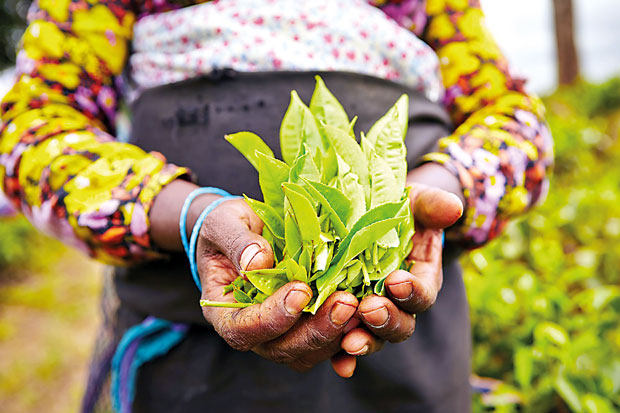30 Aug 2017 - {{hitsCtrl.values.hits}}

 Sri Lankans are gifted with two psychological traits by birth and they are being emotional and also being jealous. At a time we celebrate 150 years of tea in Sri Lanka, it will be a worthwhile effort to view as to how these two traits have affected the industry, the employees and the decision makers alike.
Sri Lankans are gifted with two psychological traits by birth and they are being emotional and also being jealous. At a time we celebrate 150 years of tea in Sri Lanka, it will be a worthwhile effort to view as to how these two traits have affected the industry, the employees and the decision makers alike.
It is not a secret that the cost of production of plantation products consists of 65 percent of labour. A similar industry like garments has undertaken lots of human resource management (HRM) interventions to bring the labour cost down, whilst increasing labour productivity and the earning power of both the employer and employee.
Although the right thinking is to look at practical and viable alternatives that could solve the visible and identified problem of high cost of labour, the industry moves on with the evil mentality of these emotional attachments of traditional mindsets imply because the industry is averse to change. Some of the old and weak top executives are scared to employ any “change initiatives” due to fear of failing at that age.
The net result is inability to manage change. In other words these executives have become prisoners in their own homes. Neither them nor the employees below them are job satisfied and have laid the foundation for mediocre bottom line performances. We reiterate that this trend can be reversed. The magic wand is in the hands of Minister Navin Dissanayake, who proved his mettle through many interventions and one such is the recently concluded plantations exhibition at the BMICH, which is truly world class and informative.
That’s how the industry has moved with being emotional. Being jealous is another aspect and for that they feel pretty bad to learn from someone doing well. The common platform for both, these psychological sicknesses is high ego stemming from poor quality (ego centric) of thinking.
The trend of poor quality of decision-making can be reversed only through state policies. Regular monitoring and decisions on increasing competencies can be executed through the National Institute of Personnel Management (NIPM). Education can bring about permanent change in attitudes. This process remains a quick fix to the big issue of high cost due to its association with the industry since 1984.
Tea production in Sri Lanka perhaps can be compared with that of wine production in France, Italy or in any other country due to similar scale of operations. Every vineyard owner knows how to market their vines without brokers. Over the years Ceylon teas have earned a reputation synonymous with purity and quality. However, the tea industry lacked the leadership, necessary direction and drifted without a proper marketing plan for products. Continuation of the trend has led to pathetic performances now responsible for the economic crisis in the industry. This is definitely threatening the survival of 200,000 lives directly employed.
Making matters worse the climate change is adding insult to injury. Broadcasting fertilizer has encouraged root growth towards the surface of the land instead of penetrating deeper down to reach moisture. When the top layers of soils are dried up during droughts the root are starved of moisture resulting in drop of crop.
These are the outcomes of our performances that are available to celebrate 150 years of tea in Ceylon. The opportunities arising out of these planter-made blunders in the past as well as at present are enormous. So we need a standard to define the profession called planter.
Planter defined
“A planter leads an agribusiness professionally to reach desired growth sustainably.” The Ceylon Planters’ Society in consultation with the Planters’ Association of Ceylon has launched this initiative of defining a planter under the guidance of Prof. Ajantha Dharmasiri of the IPM.
The key terms are explained as follows. Leading means guidance, direction, control, management, superintendence, supervision. Agribusiness means agriculture conducted on commercial principles, especially using advanced technology. A professional is supposed get engaged in a specified activity as one’s main paid occupation rather than as an amateur.
A ‘growth company’ is any company whose business generates significant positive cash flows or earnings, which increase at significantly faster rates than the overall economy. A growth company tends to have very profitable reinvestment opportunities for its own retained earnings.
Sustainably is avoidance of the depletion of natural resources in order to maintain an ecological balance. This initiative is the only successful attempt in the world for the first time. All social media may take a lead from this effort. What a fitting appreciation of James Tailor at a time his initiative is celebrated after 150 years.
Tea consumers are wishful of longevity and good health. It’s the antioxidants in tea that make the difference. We have seven agro climatic regions of tea. What suits more for Sri Lankan pallet is tea grown in the Dimbula region. Both antioxidants and pallet can make a premium product but we have to dive down to numbers and tell the consumer how much of antioxidants they can take out of five grams of tea and how many cups of tea to be consumed to meet the daily requirement of antioxidants.
That can easily be translated into financial terms. We can move from takers market to makers market. The outcomes can be enriched with other herbs contributing to high antioxidants that are grown here. Sri Lanka is full of medicinal herbs. Or else mix up with Stevia so that sugar is not needed to serve with sweetness. Then these become speciality teas. That’s how the conceptual framework shown above can deliver value.
Capabilities and resources must be exploited to create substantial value. We have been repeatedly pointed out the need to use alternate food grade machinery using advanced technologies to make it happen. A new product. In the event we continue to produce commodities, we have the power and capacity to get into commodities or futures market. Are our brokers or the Colombo Stock Exchange ready for that?
We should maintain our image on Pure Ceylon Tea. Improving the performances of marketing will lead to break the vicious cycle of not being able to afford high-quality labour with high level of competencies. This in turn will lead to reduction in overall cost. In fact, tea pluckers can be transformed to become harvesting experts, who will be of consultants’ quality when their competencies are blended with ‘self-managed’ capabilities.
I reiterate the fundamental mistake with the tea industry of Sri Lanka is the lack of a product mix that should be appealing to different market segments, whiles giving the producer a sizable margin to maintain the economic viability of the industry.
Another aspect worth considering is the leadership provided by the planters who were instrumental in making a good or bad plantation. Many of them had the pride of showcasing their estates and star performers then. They earned respect and there was no need to demand respect.
It’s pathetic to note that today planters are loaded with responsibilities but they don’t have the matching authority. In short, the mentality of Plantation Raj has been stolen from them visibly. These are the ill-rotten souvenirs or the bitter truth we have to solve at a time we are 150 years old.
This is why we say that the plantations management since nationalisation is a world-class case study for mismanagement. Another historic action that can be initiated by both the minister and prime minister is to invite Harvard professors to document this national crime and correct the strategic management of deserving regional plantation companies for the benefit of the future generation before it is too late.
Paying tribute
One will be failing in his duty, if he does not take this opportunity to pay tribute to many planters who made the supreme sacrifice in the course of discharging of their duty. We salute Dilmah Founder and Chairman Merrill J. Fernando and his family for hosting the planting community to celebrate the 150 years of Ceylon Tea at the Dutch Burgher Union, on July 29, 2017.
Dilmah tea reproduced its ‘History of Ceylon Tea’ website, which documents the creation of Ceylon Tea since mid-1800s. This landmark project may be the first and only one of its kind in the tea industry and has been hailed by the planters who were there as a truly significant contribution to the tea industry. We also have to mention that the website hosted by the Ceylon Planters’ Society also supports the industry to some extent.
Fernando partnered with the Planters’ Association to initiate the History of Ceylon Tea Project as a glorious tribute to the pioneers of Ceylon Tea and the industry as a whole and also as a reminder to the future generations of the origins of an industry that made Ceylon Tea famous.
He has opened the gates for digital marketing and social media of marketing of tea. Perhaps anyone can take forward the work done by Fernando and the concepts explained through this article to uplift the industry.
It gives the future generation of planters the opportunity to study and understand the heritage of one of the world’s greatest plantation industries. At the function, Fernando said Dilma gained consumer recognition globally on the strength of the Finest Ceylon Tea. He paid a great tribute to the men (planters) of dedication and courage to build an industry that made Ceylon the home of the world’s finest tea. That’s a greatest compliment to James Tailor and the unsung heroes slain, retired and currently engaged with this golden crop in this tiny island.
It is nothing but correct to support planter professionals and those who are involved in agriculture to grant bank loans at concessionary rates to rejuvenate the unproductive plantations and similar agricultural entities. It is also appropriate to consider a fitting retirement scheme for the 200,000 workforce of the industry, who have laboured most of the productive life time to make this island famous all over the world, with mutual benefits. The minimum pension should be Rs.25000 per month and that is still possible. This also can help to overcome the shortage of workers to undertake plantation agricultural activities.
So we conclude that the celebrations of 150 years of tea since planted by James Tailor and the rest and to those who paid supreme sacrifice due to terrorism, whilst endeavouring to safeguard these plantations, we dedicate these few thoughts.
One master plan for the industry is a must. Right people drive business and as such we hope and pray that the HRM concepts be employed in the industry without any further delay to ensure the efforts employed by all and saved the industry to date so far are continued for many centuries to come.
Plantation remains the best candidate for reasonable investments for long-term returns. US $ 10 billion in the medium term is only a thought away.
06 Jan 2025 1 hours ago
06 Jan 2025 2 hours ago
06 Jan 2025 2 hours ago
06 Jan 2025 2 hours ago
06 Jan 2025 2 hours ago